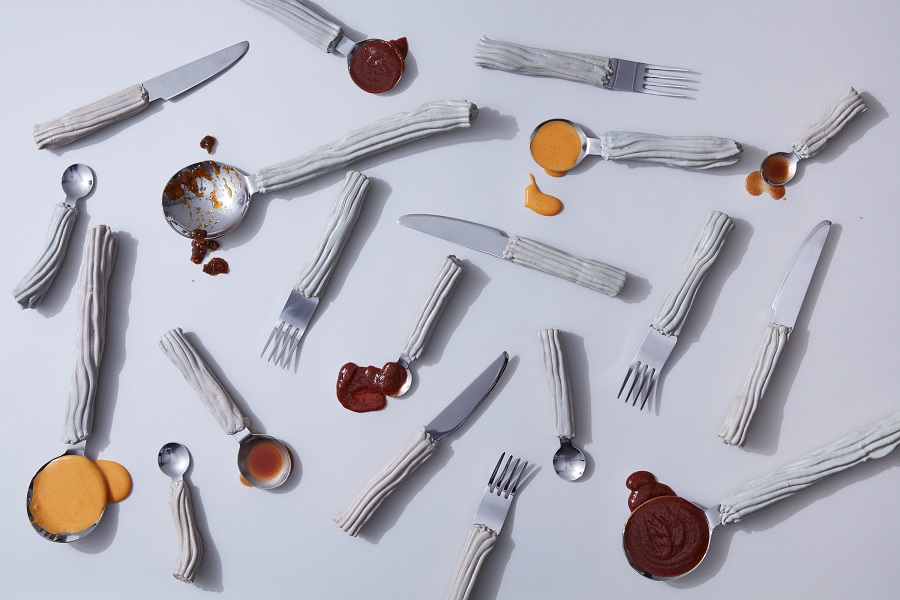Call for Submissions for SACO 2020
6 February 202011th Berlin Biennale Announces Venues and Dates
10 February 2020
Plastic Baroque Cutlery, James Shaw
5th Istanbul Design Biennial
Empathy Revisited: designs for more than one
September 26 – November 8, 2020
https://tasarimbienali.iksv.org/en
Organised by the Istanbul Foundation for Culture and Arts (İKSV) and curated by Mariana Pestana, the 5th Istanbul Design Biennial will take place on 26 September – 8 November 2020. To be held with the title Empathy Revisited: designs for more than one, the biennial invites everyone from around the world to respond to the open call.
Starting off from the idea that design comprises the devices, platforms and interfaces through which we relate to one another, Empathy Revisited: designs for more than one revisits the origins of the notion of empathy to imagine a role for design concerned with feelings, affects and relations.
The biennial will comprise a Kitchen and an Observatory, which will take place in two separate venues. The projects and events that revolve around the Kitchen will be selected amongst the open call submissions. The open call is extended to all local or international practitioners and thinkers including designers, artists, writers, architects, curators, researchers, academics, food practitioners, cooks and culinary enthusiasts. The deadline to apply is 28 February 2020.
Joining Mariana Pestana for the 5th Istanbul Design Biennial’s curatorial team are Billie Muraben (Assistant Curator & Deputy Editor) and Sumitra Upham (Curator of Programmes).
The Kitchen
Kitchens are shared spaces of encounter. They embrace social differences, and facilitate the circulation of ideas, and practices of care, empathy and hospitality. Throughout history, kitchens have been the subject of designers, architects and artists’s work, engaged in ideas surrounding the value, production and distribution of food and the socio-political aspects of cooking and dining. Margarete Schütte-Lihotzky’s design for the Frankfurt Kitchen (1926) introduced efficiency to domestic labour; Martha Rosler’s Semiotics of the Kitchen (1975) is a feminist performance parody of television cooking demonstrations, where kitchen tools become alphabetised and gestures indicate rage and oppression; Carol Goodden, Tina Girouard and Gordon Matta-Clark’s conceptual restaurant FOOD (1972), was a space of encounter for local communities in a gentrifying New York City. More recently, Michael Rakowitz bridged connections between hostility and hospitality in his Enemy Kitchen (2003); while Anna Puigjaner’s Kitchenless Cities (2016) offered a new typology for organising and distributing domestic spaces. In 2020, the Istanbul Design Biennial re-frames the kitchen as a space that is central to design thinking and production, reflecting the specific ecological, economical and geopolitical contexts of today and in years to come.
This Kitchen is a new site for experimentation, conversation, sharing and action. Forming part of the programme for the 5th Istanbul Design Biennial – Empathy Revisited: designs for more than one, it functions as a social and convivial space, a display, a cafe, a cooking school and a platform for performance. Inside the Kitchen, visitors can engage in the passage of food from plant to palate; take part in collective culinary traditions; and examine how food exchange, preparation and consumption impacts contemporary culture.
The Kitchen invites visitors to consider and experience design in an expanded sense, through its equipment and furnishings; its materiality and spatial conditions; its relationship to the body and its senses; and its potential to affect human behaviour. A public programme will activate the Kitchen during the biennial, challenging practices of hospitality and rethinking the relationship between host and guest.
Open Call for Menus & Tools
The curatorial team of the 5th Istanbul Design Biennial is seeking applications for ‘Menus’ and ‘Tools’ for the Kitchen programme.
The projects submitted should reflect the themes of the biennial, Empathy Revisited: designs for more than one, and must expand on the ideas and questions raised in the curatorial statement.
MENUS
Menus are projects that propose different cultural approaches to eating and dining informed by global conditions, socio-economic challenges, and contemporary discourse. They should contain ingredients, rituals and systems relating to food or culinary traditions that rethink the role of host and guest, establish collective practices, and build strategies to communalise the kitchen.
Whether menus take the form of a learning and engagement programme, or a one-off project, they must demonstrate the ability to engage both local and international audiences in new discussions surrounding design and food. Successful applicants will be invited to host a week or a weekend in residency at the Kitchen, testing their menus on the public.
Types of Menus
Menu A La Carte (Tuesday-Friday)
During the week, the Kitchen functions as a participatory space for knowledge sharing and production. A programme of A La Carte menus will activate the space during the working week, where visitors can collaborate, test ideas and discover new perspectives on food, through design.
Proposals for A La Carte menus should be learning and engagement programmes, characterised by research, dialogue and participation. They could comprise performances, talks, seminars, lectures, workshops, salons or screenings. They should aim to build new knowledge and skills in dialogue with local audiences and communities in Istanbul.
Building on the idea of an A La Carte menu, these proposals offer visitors the freedom to choose from a range of ‘dishes’ (e.g. activities and events) that best suit their interests.
Duration: A La Carte menus should serve visitors for a 4 day period.
Menu Table d’hôte (weekends)
On weekends, the Kitchen will be transformed into a performance space for local and international audiences.
These menus are site-specific projects involving performance, collaborative and participatory design practices that challenge pre-existing forms of ‘cooking’ and ‘dining’. They might include: food, spoken word, choreography, video and sound-based practices.
Building on the idea of Table d’hôte (set menus), these curated ‘meals’ are served to all guests at stated times throughout the weekend.
Duration: Weekend menus should serve visitors for a 1-3-day period.
TOOLS
Tools are objects found in kitchens that support and expand ways of cooking and eating. They respond to common kitchen tasks for preparing food (cutting, heating, baking, grinding, mixing, blending, and measuring), as well as for dining (eating, drinking, sharing, folding, cheersing, and talking).
The biennial is inviting applications from designers, architects and artists to propose individual tools or tool sets that interrogate the concept of ‘kitchen utensils’; creating new traditions for food preparation and eating. Tools should challenge the common typologies of utensils to create new processes and systems that serve the modern kitchen, the diverse needs of its users and the demands of contemporary domestic life. Tools should consider rituals of commensality and introduce innovative approaches to table etiquette. Their design must respond to the current context of Istanbul and theme of the biennial.
Types of kitchen tools might include: plates, cutlery, coasters, tablecloths, alternative seating, pots and pans and glassware. The selected tools will be on display in the Kitchen and will also be activated by the public through the ‘menus’ programme.
For further details and requirements about the application: https://tasarimbienali.iksv.
To apply to the open call: https://forms.gle/



